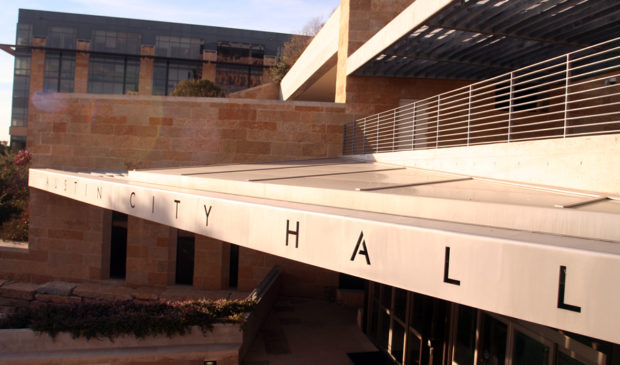Council talks six-month delay for bulk of police budget reform
Wednesday, August 5, 2020 by
Ryan Thornton As City Council struggles to comprehend what it would mean to cut approximately $100 million from the Austin Police Department’s budget for Fiscal Year 2020-21, Council members are floating a temporary fix: approve half of the department’s budget during next week’s budget adoption process and return in six months to consider a revised budget for the rest of the year.
With Council set to begin budget hearings next Wednesday, Mayor Steve Adler said he agreed with many of the goals of reallocating a significant portion of police dollars, including the need for a robust mental health first response program and moving the city’s forensic lab under a different department. Still, he admitted he is unsure “how to get from here to there” within that time frame.
Council Member Natasha Harper-Madison proposed the six-month solution on the City Council Message Board Tuesday as an option to give Deputy City Manager Nuria Rivera-Vandermyde and Police Monitor Farah Muscadin time to develop a plan without waiting another fiscal cycle to reform the city’s public safety strategies.
“This year’s accelerated budget process has really left us with little time to do the work that’s necessary to create lasting change in how our city addresses public safety,” Harper-Madison said during Tuesday’s work session.
Considering that the city will need to create new police training protocols to meet higher ethical standards, Harper-Madison proposed delaying the November police cadet class this year and directing the $6 million in savings to Austin Public Health, workforce development, increased EMS capacity, healthy food access, mental health intervention, and a handful of other equity-centered efforts.
“We can avoid (misconduct) by at the very beginning having the kind of department that doesn’t attract people that will engage in misconduct,” Harper-Madison said. “We don’t want this to be a bastion for them; we want this to be the kind of job they don’t want. There’s going to be too much in the way of accountability expectations and scrutiny and effective leadership and effective discipline.”
Adler said the six-month solution coupled with a calendar for the broader department reform process makes sense, but Council Member Alison Alter said it will be important to combine that timeline with an outcomes-driven budgeting process or the city could end up with roughly the same $434 million police budget we have today.
The city is putting together a city/community task force to help develop budget amendments and a process calendar to bring to Council as soon as this fall. Rivera-Vandermyde said the group could hold its first meeting within the next couple of weeks if the participating organizations are available.
Among the various funding scenarios and recommendations proposed so far, Police Chief Brian Manley emphasized the negative consequences that could result from delaying or canceling the November cadet class while simultaneously cutting any amount of overtime funding. Without holding the cadet class and filling police staffing vacancies, Manley said overtime spending would be likely to increase further.
On the other hand, Manley said the department is open to having a conversation about releasing some of its responsibilities, like mental health response, that would certainly be better served by professional social workers. However, he framed Flannigan’s long-term suggestion of breaking the department into a handful of separate departments as a step backward and accused Council members of seeking arbitrary budget cuts totaling $100 million just to be able to say they did so.
“The proposals we’re delivering right now are modest,” Flannigan said. “We’re talking about a scale that is a drop in the bucket, certainly a drop in the bucket compared to what the community is asking for.”
Casar, whose proposal would cut $93 million in immediate reallocations with an additional $30 million in potential further cuts and decouplings, added that these police budget reductions would happen gradually over the entire fiscal year at the same time as new services are made available to help divert the need for police response.
“We are saying we want to reallocate money to substance use care or reallocate money to violence prevention, and what we expect on the administrative side is to use those dollars and to make sure they are used effectively and well so that people are not having to call 911 as much in the first place,” Casar said.
Photo made available through a Creative Commons license.
The Austin Monitor’s work is made possible by donations from the community. Though our reporting covers donors from time to time, we are careful to keep business and editorial efforts separate while maintaining transparency. A complete list of donors is available here, and our code of ethics is explained here.
You're a community leader
And we’re honored you look to us for serious, in-depth news. You know a strong community needs local and dedicated watchdog reporting. We’re here for you and that won’t change. Now will you take the powerful next step and support our nonprofit news organization?






